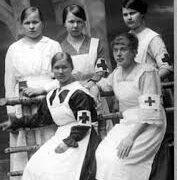‘Being plain almost to repulsion’ was the rule for nurses in American Civil War
Published on: 11/13/20 12:53 PM

Attitudes towards women being active in the American Civil War of 1861 were misogynistic and offensive until need overcame prejudice. While cross-dressed women (an estimated 750 known) were slipping through the military net into the ranks, others were being accepted for the first time as official nurses, the Americans following the British use of Florence Nightingale and actually getting her to advise them too. Louisa May Alcott became a nurse as did Emma Edmonds who became a spy as well and wrote,‘I could only thank God that I was free and could go forward and work, and I was not obliged to stay at home and weep.’But women were not welcome. One medical surgeon wrote in 1861 that, ‘our women appear to have become almost wild on the subject of hospital nursing…women in our humble opinion are utterly and decidedly unfit for such service.’ Women wanting to be nurses had to fulfil certain stringent recruitment requirements, overseen by Dorothea Dix which were: to be past thirty, ‘plain almost to repulsion in dress and devoid of personal attractions.’ They could not have ‘coloured dresses, hoops, curls, jewelry, and flowers on their bonnets.’ They were also white, although black women were later admitted.The Army Surgeon-General, seeing so many wounded men dying through dirt and neglect soon said he would take on any women as nurses ‘irrespective of age, size or looks’ and so ended the decree that women-especially attractive ones- and war did not go together. It did not end the carping by Army Commanders. General Ewell said women ‘would make a grand brigade if it were not for snakes and spiders;’ while General Rosecrans hated the sight of women in his camps, especially when one of his sergeants ‘was delivered of a baby!’ Another woman who had served in the Federal army described as ‘stout and muscular’ in her late twenties, was returned by the Confederates who had captured her. They pointedly wrote in the note she carried: ‘As Confederates do not use women in war, this woman, wounded in battle, is returned to you.The media, namely newspapers, were blamed for encouraging young girls to enrol as nurses and applauding what they called ‘latter-day Joan of Arcs’ and their ‘spunk and pluck’.
